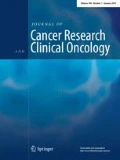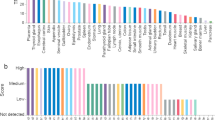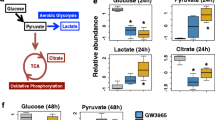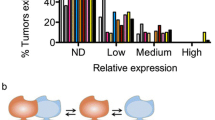Abstract
Background
Peroxisome-proliferator-activated receptors (PPARs) are nuclear receptors for fatty acids and their derivatives. PPAR subtypes PPARγ and PPARβ/δ are suspected to modulate cancer development in the colon, but their exact role is still discussed controversially.
Methods
The present study investigated the impact of PPARγ and PPARβ/δ on vascular endothelial growth factor (VEGF) and cyclooxygenase 2 (COX-2) expressions induced by synthetic and physiological agonists in the colorectal tumor cell lines SW480 and HT29 using reporter gene assays, qRT-PCR and ELISA.
Results
Activation of both PPARγ and PPARβ/δ induced expression of VEGF mRNA and protein in a PPAR-dependent way. The PPARγ agonists ciglitazone and PGJ2 were the most effective inducers with up to ninefold and threefold increases in VEGF mRNA in SW480 and HT29 cultures, respectively. VEGF secretion was doubled in both cell lines. The PPARβ/δ agonists GW501516 and PGI2 caused stimulations of only 1.5-fold in both cell lines. In addition, all PPAR agonists induced COX-2 mRNA and secretion of the COX-2 product PGE2 in HT29 cells. However, this effect was not blocked by knock-down of PPAR expression nor was it essential for VEGF expression as shown by the lack of effect of the COX-2 inhibitor SC236.
Conclusion
In summary, our results identify both PPARγ and PPARβ/δ as an alternative COX-independent mechanism of VEGF induction in colorectal tumor cells.






Similar content being viewed by others
Abbreviations
- COX:
-
Cyclooxygenase
- PG:
-
Prostaglandin
- PPAR:
-
Peroxisome-proliferator-activated receptor
- PPRE:
-
Peroxisome-proliferator response element
- K20:
-
Cytokeratin 20
- ANGPTL4:
-
Angiopoietin-like 4
References
Conn G, Bayne ML, Soderman DD et al (1990) Amino acid and cDNA sequences of a vascular endothelial cell mitogen that is homologous to platelet-derived growth factor. Proc Natl Acad Sci U S A 87:2628–2632
Desvergne B, Ijpenberg A, Devchand PR et al (1998) The peroxisome proliferator-activated receptors at the cross-road of diet and hormonal signalling. J Steroid Biochem Mol Biol 65:65–74
Farrow B, O’Connor KL, Hashimoto K et al (2003) Selective activation of PPARgamma inhibits pancreatic cancer invasion and decreases expression of tissue plasminogen activator. Surgery 134:206–212
Fauconnet S, Lascombe I, Chabannes E et al (2002) Differential regulation of vascular endothelial growth factor expression by peroxisome proliferator-activated receptors in bladder cancer cells. J Biol Chem 277:23534–23543
Ferrara N, Gerber HP, LeCouter J (2003) The biology of VEGF and its receptors. Nat Med 9:669–676
Fogh J, Fogh JM, Orfeo T (1977) One hundred and twenty-seven cultured human tumor cell lines producing tumors in nude mice. J Natl Cancer Inst 59:221–226
Glinghammar B, Skogsberg J, Hamsten A et al (2003) PPARdelta activation induces COX-2 gene expression and cell proliferation in human hepatocellular carcinoma cells. Biochem Biophys Res Commun 308:361–368
Gupta RA, Dubois RN (2001) Colorectal cancer prevention and treatment by inhibition of cyclooxygenase-2. Nat Rev Cancer 1:11–21
Gupta RA, Wang D, Katkuri S et al (2004) Activation of nuclear hormone receptor peroxisome proliferator-activated receptor-delta accelerates intestinal adenoma growth. Nat Med 10:245–247
Han S, Ritzenthaler JD, Wingerd B et al (2005) Activation of peroxisome proliferator-activated receptor beta/delta (PPARbeta/delta) increases the expression of prostaglandin E2 receptor subtype EP4. The roles of phosphatidylinositol 3-kinase and CCAAT/enhancer-binding protein beta. J Biol Chem 280:33240–33249
Hanahan D, Folkman J (1996) Patterns and emerging mechanisms of the angiogenic switch during tumorigenesis. Cell 86:353–364
Harman FS, Nicol CJ, Marin HE et al (2004) Peroxisome proliferator-activated receptor-delta attenuates colon carcinogenesis. Nat Med 10:481–483
He TC, Chan TA, Vogelstein B et al (1999) PPARdelta is an APC-regulated target of nonsteroidal anti-inflammatory drugs. Cell 99:335–345
Hollingshead HE, Morimura K, Adachi M et al (2007) PPARbeta/delta protects against experimental colitis through a ligand-independent mechanism. Dig Dis Sci 52:2912–2919
Jackson L, Wahli W, Michalik L et al (2003) Potential role for peroxisome proliferator activated receptor (PPAR) in preventing colon cancer. Gut 52:1317–1322
Jurek D, Fleckl E, Marian B (2005a) Bile acid induced gene expression in LT97 colonic adenoma cells. Food Chem Toxicol 43:87–93
Jurek D, Udilova N, Jozkowicz A et al (2005b) Dietary lipid hydroperoxides induce expression of vascular endothelial growth factor (VEGF) in human colorectal tumor cells. Faseb J 19:97–99
Kersten S, Wahli W (2000) Peroxisome proliferator activated receptor agonists. Exs 89:141–151
Kim E-H, Surh Y-J (2008) The role of 15-deoxy-[Delta]12, 14-prostaglandin J2, an endogenous ligand of peroxisome proliferator-activated receptor [gamma], in tumor angiogenesis. Biochem Pharmacol 76:1544–1553
Kitamura S, Miyazaki Y, Shinomura Y et al (1999) Peroxisome proliferator-activated receptor gamma induces growth arrest and differentiation markers of human colon cancer cells. Jpn J Cancer Res 90:75–80
Kitamura S, Miyazaki Y, Hiraoka S et al (2001) PPARgamma agonists inhibit cell growth and suppress the expression of cyclin D1 and EGF-like growth factors in ras-transformed rat intestinal epithelial cells. Int J Cancer 94:335–342
Kliewer SA, Umesono K, Noonan DJ et al (1992) Convergence of 9-cis retinoic acid and peroxisome proliferator signalling pathways through heterodimer formation of their receptors. Nature 358:771–774
Knutsen HK, Olstorn HB, Paulsen JE et al (2005) Increased levels of PPARbeta/delta and cyclin D1 in flat dysplastic ACF and adenomas in Apc(Min/+) mice. Anticancer Res 25:3781–3789
Krey G, Mahfoudi A, Wahli W (1995) Functional interactions of peroxisome proliferator-activated receptor, retinoid-X receptor, and Sp1 in the transcriptional regulation of the acyl-coenzyme-A oxidase promoter. Mol Endocrinol 9:219–231
Krey G, Braissant O, L’Horset F et al (1997) Fatty acids, eicosanoids, and hypolipidemic agents identified as ligands of peroxisome proliferator-activated receptors by coactivator-dependent receptor ligand assay. Mol Endocrinol 11:779–791
Leibovitz A, Stinson JC, McCombs WB 3rd et al (1976) Classification of human colorectal adenocarcinoma cell lines. Cancer Res 36:4562–4569
Marin HE, Peraza MA, Billin AN et al (2006) Ligand activation of peroxisome proliferator-activated receptor beta inhibits colon carcinogenesis. Cancer Res 66:4394–4401
Michalik L, Wahli W (1999) Peroxisome proliferator-activated receptors: three isotypes for a multitude of functions. Curr Opin Biotechnol 10:564–570
Michalik L, Desvergne B, Wahli W (2004) Peroxisome-proliferator-activated receptors and cancers: complex stories. Nat Rev Cancer 4:61–70
Muto T, Bussey HJ, Morson BC (1975) The evolution of cancer of the colon and rectum. Cancer 36:2251–2270
Ondrey F (2009) Peroxisome proliferator-activated receptor gamma pathway targeting in carcinogenesis: implications for chemoprevention. Clin Cancer Res 15:2–8
Osawa E, Nakajima A, Wada K et al (2003) Peroxisome proliferator-activated receptor gamma ligands suppress colon carcinogenesis induced by azoxymethane in mice. Gastroenterology 124:361–367
Park BH, Vogelstein B, Kinzler KW (2001) Genetic disruption of PPARdelta decreases the tumorigenicity of human colon cancer cells. Proc Natl Acad Sci U S A 98:2598–2603
Peters JM, Hollingshead HE, Gonzalez FJ (2008) Role of peroxisome-proliferator-activated receptor β/Î′ (PPARβ/Î′) in gastrointestinal tract function and disease. Clin Sci 115:107–127
Richter M, Weiss M, Weinberger I et al (2001) Growth inhibition and induction of apoptosis in colorectal tumor cells by cyclooxygenase inhibitors. Carcinogenesis 22:17–25
Rubenstrunk A, Hanf R, Hum DW et al (2007) Safety issues and prospects for future generations of PPAR modulators. Biochim Biophys Acta 1771:1065–1081
Sarraf P, Mueller E, Smith WM et al (1999) Loss-of-function mutations in PPAR gamma associated with human colon cancer. Mol Cell 3:799–804
Schroy PC 3rd, Brown-Shimer S, Kim K et al (1995) Detection of p21ras mutations in colorectal adenomas and carcinomas by enzyme-linked immunosorbent assay. Cancer 76:201–209
Shureiqi I, Chen D, Lotan R et al (2000) 15-Lipoxygenase-1 mediates nonsteroidal anti-inflammatory drug-induced apoptosis independently of cyclooxygenase-2 in colon cancer cells. Cancer Res 60:6846–6850
Shureiqi I, Jiang W, Zuo X et al (2003) The 15-lipoxygenase-1 product 13-S-hydroxyoctadecadienoic acid down-regulates PPAR-delta to induce apoptosis in colorectal cancer cells. Proc Natl Acad Sci U S A 100:9968–9973
Stanley TB, Leesnitzer LM, Montana VG et al (2003) Subtype specific effects of peroxisome proliferator-activated receptor ligands on corepressor affinity. Biochemistry 42:9278–9287
Takashima T, Fujiwara Y, Higuchi K et al (2001) PPAR-gamma ligands inhibit growth of human esophageal adenocarcinoma cells through induction of apoptosis, cell cycle arrest and reduction of ornithine decarboxylase activity. Int J Oncol 19:465–471
Takayama O, Yamamoto H, Damdinsuren B et al (2006) Expression of PPARdelta in multistage carcinogenesis of the colorectum: implications of malignant cancer morphology. Br J Cancer 95:889–895
Tan NS, Michalik L, Desvergne B et al (2005) Multiple expression control mechanisms of peroxisome proliferator-activated receptors and their target genes. J Steroid Biochem Mol Biol 93:99–105
Wang D, Dubois RN (2008) Peroxisome proliferator-activated receptors and progression of colorectal cancer. PPAR Res 2008:931074
Wang D, Wang H, Guo Y et al (2006) Crosstalk between peroxisome proliferator-activated receptor Î′ and VEGF stimulates cancer progression. Proc Natl Acad Sci U S A 103:19069–19074
Xu L, Han C, Lim K et al (2006a) Cross-talk between peroxisome proliferator-activated receptor delta and cytosolic phospholipase A(2)alpha/cyclooxygenase-2/prostaglandin E(2) signaling pathways in human hepatocellular carcinoma cells. Cancer Res 66:11859–11868
Xu L, Han C, Wu T (2006b) A novel positive feedback loop between peroxisome proliferator-activated receptor-delta and prostaglandin E2 signaling pathways for human cholangiocarcinoma cell growth. J Biol Chem 281:33982–33996
Yang K, Fan KH, Lamprecht SA et al (2005) Peroxisome proliferator-activated receptor gamma agonist troglitazone induces colon tumors in normal C57BL/6 J mice and enhances colonic carcinogenesis in Apc1638 N/+ Mlh1 ± double mutant mice. Int J Cancer 116:495–499
Yang L, Zhou ZG, Zheng XL et al (2008) RNA interference against peroxisome proliferator-activated receptor delta gene promotes proliferation of human colorectal cancer cells. Dis Colon Rectum 51:318–326 (discussion 326-8)
Zhai Y, Wu R, Schwartz DR et al (2002) Role of beta-catenin/T-cell factor-regulated genes in ovarian endometrioid adenocarcinomas. Am J Pathol 160:1229–1238
Acknowledgments
This study was supported by grants from the Austrian National Bank (#10630) and from the Herzfelder’sche Familienstiftung.
Conflict of interest statement
We have no conflict of interest to declare.
Author information
Authors and Affiliations
Corresponding author
Additional information
C. Röhrl, U. Kaindl authors contributed equally to this work.
Rights and permissions
About this article
Cite this article
Röhrl, C., Kaindl, U., Koneczny, I. et al. Peroxisome-proliferator-activated receptors γ and β/δ mediate vascular endothelial growth factor production in colorectal tumor cells. J Cancer Res Clin Oncol 137, 29–39 (2011). https://doi.org/10.1007/s00432-010-0856-1
Received:
Accepted:
Published:
Issue Date:
DOI: https://doi.org/10.1007/s00432-010-0856-1




